If you have a grass and concrete backyard, you definitely find it a bit challenging when the time comes for cleaning your concrete patio! The biggest concern is the grass: how should you clean the concrete surface without damaging the grass?
In this article, we will try to provide you with the most useful cleaning methods that can be safely used on such patios. You will learn how to clean a patio that is made of cement, and what exactly should be done in order to protect the grass that is growing there.
In addition, we will tell you what to use to clean your concrete patio and keep the surface of it safe and undamaged.
With our guide, you will be able to maintain your concrete patio correctly, avoiding the damage of the material which often happens because of the wrong cleaning approach.
And moreover, if you have any grass growing around your patio, it will also stay safe and sound with the safe cleaning options we suggest.
How to Clean a Concrete Patio And Keep the Grass Untouched?
A patio that is made of concrete is a long-lasting investment, and often, because of its durability, people forget to clean it regularly.
Of course, such a neglecting attitude often leads to the dirt accumulating in the crevices and cracks, as well as all sorts of stains that appear on the surface of the cement (for example, those could be the grass or berry stains).
This is why washing your concrete patio regularly is the best way to keep it clean and extend its lifespan. As a bonus, regular and proper maintenance will keep the material in a good state longer as well.
Below, you can find a few alternative cleaning methods that can be used equally successfully should you need to have your concrete patio cleaned. In addition, we will explain to you why certain cleaning methods should be avoided even despite the fact that they take less time and effort for cleaning.
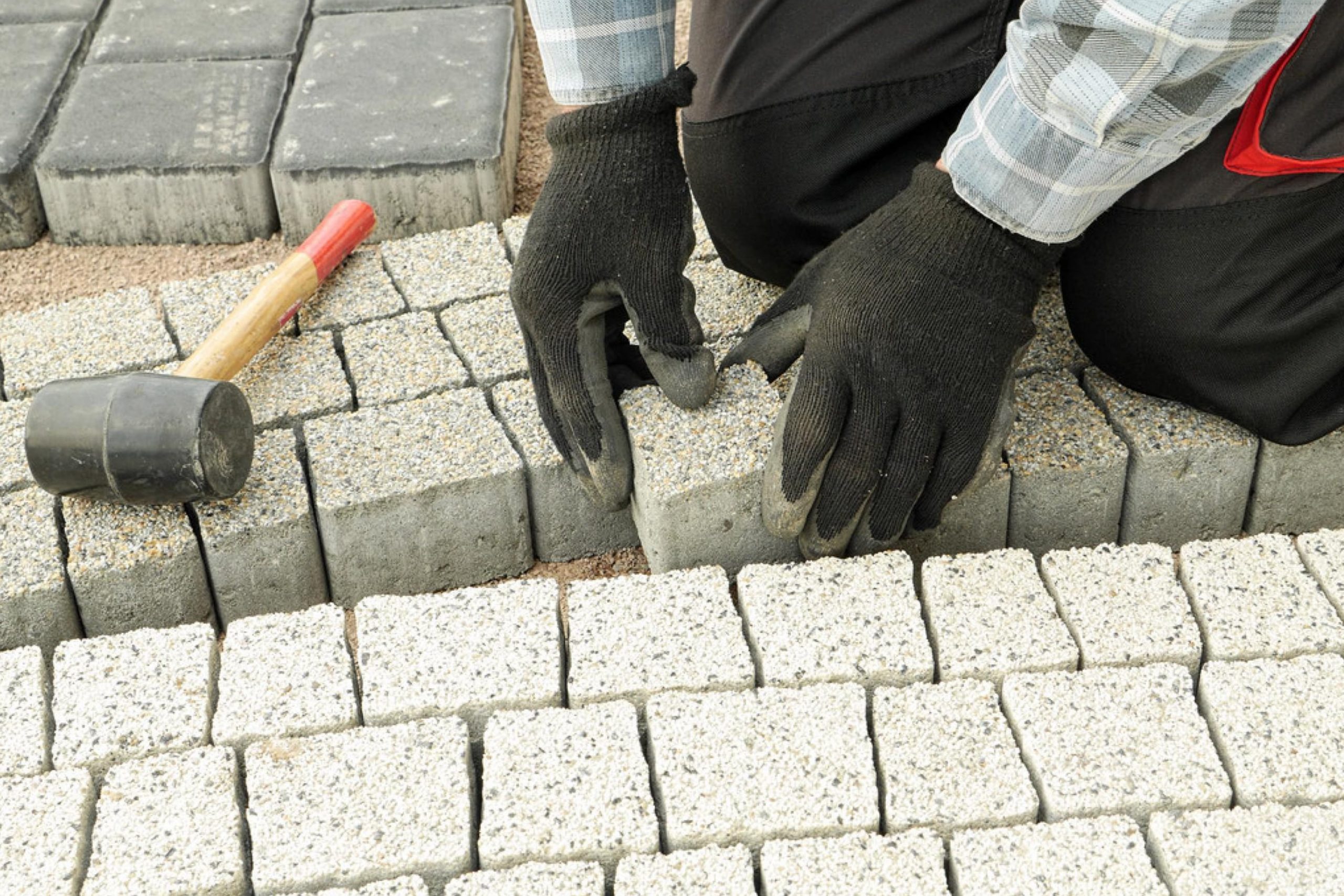
Use Environmentally Friendly Cleaning
This cleaning method would become handy if your concrete patio is not yet heavily stained or too dirty. Of course, once a stain occurs on a concrete surface, most homeowners urge to use harsh cleaning products and more aggressive methods of cleaning. Nevertheless, this might not even be necessary!
Instead, try to start with a gentle approach by using degreasing detergent, water, and a broom with stiff bristles.
- Start with saturating the concrete and watering the surrounding plants and soil first
- Then, prepare a cleaning solution of 1/8 cup degreasing dishwashing liquid, 1/2 cup baking soda, and 1 cup hydrogen peroxide in 1 gallon of water
- Using this detergent and water solution, scrub the concrete surface with the broom
This cleaning solution is great if you need to escalate your efforts and also keep your plants and grass around the patio safe. At this point, some of you may say that a pressure washer would be a much faster and easier option. However, we would not recommend you use it, and this is why.
Cleaning with a pressure washer really sounds like a quick way to clean your concrete patio, but pressure washers use pressures of 1,500 to 3,300 pounds per square inch. Such a high-pressure stream can not only cause injuries to you but also will damage the concrete surface if the nozzle is too close to the concrete.
In addition, the force of the water used in pressure washers will most likely gouge out soil and grass when you pressure wash along the edge of the patio. And even though the grass can be replaced, the damage to the plant might be permanent.
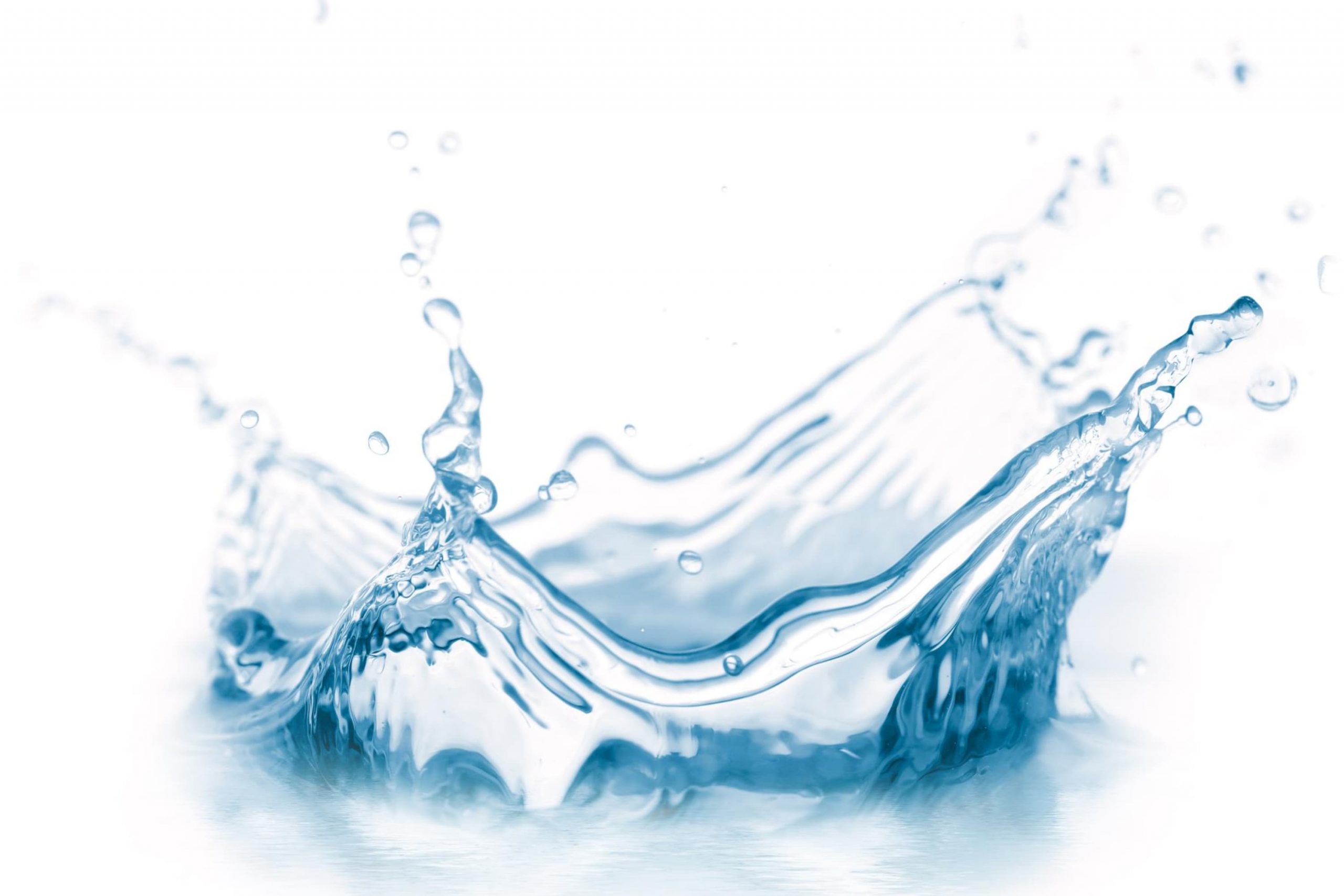
Make Use Of a Regular Dishwashing Liquid
If you need to clean your concrete patio and do it safely for the grass that is growing there, a few squirts of any dishwashing liquid will become very helpful. In order to use this cleaning method, you will need to get a few tools ready first:
- Plastic Bucket
- Hose
- Stiff Bristled Broom
- Dishwashing Liquid
- Hot Water
First of all, you need to rinse off the entire patio with a hose thoroughly. It will help you remove any dirt, dust, and other debris that might get accumulated in the crevices and in between the concrete plates.
The next step would be using soap and water in a bucket to wash your concrete surface. At this point, make sure that the washing liquid you will be using contains no bleach! See, bleaching products are very harmful to any plants including grass, so if a bleach-containing soap or even the suds will end up on your grass, chances are high that it will be killed!
Mix together two tablespoons of mild dish soap and three gallons of warm water in a bucket. Add the soap to the bucket slowly, stirring with your hands until it is completely dissolved. Now you can start cleaning your patio.
- Apply your soapy solution to the dirty areas of your patio
- Work on one small dirty area at a time with a scrub brush until you remove the dirt
- Make sure you give your patio enough time to dry off completely
- When it is fully dry, sweep it carefully to remove any residual dirt and dust that might be left on the surface
When using this cleaning method, avoid pouring boiling water over the concrete surface of the patio! It will break down grease and dirt indeed, but also, it will kill your grass and plants!
Opt For White Vinegar to Deal With the Tough Stains
If your concrete patio got stained with the grass or some berry juice, those marks can be easily removed with the help of the solution we have shared with you above. However, we often keep garden furniture in our patios, and if this furniture is made of any metal, rusty marks may stay on your concrete slabs.
To cope with the marks left by rust, you will need another solution. For removing rust stains from a concrete patio, you will need to do the following:
- Wet the stained area on your concrete with white vinegar for about 20 minutes
- Scrub it briskly
- Rinse well right after you are done scrubbing
However, this method is a bit less safe for the grass in comparison to the one described above. See, vinegar sprayed directly on weeds or grass kills them because of its high acidity.
This is why make sure that you dilute the vinegar with plenty of rinse water before you apply it to the concrete surface.
These methods, as well as cleaning solutions, will help you cope with the stains and dirt on your concrete patio relatively easily. In addition, each of these homemade solutions is safe for the grass – well, except for the vinegar, perhaps, but this can be easily fixed!
However, there is a product that you should never use on your concrete patio for cleaning if there is grass around it or between the concrete plates. Below, you can read more about it.
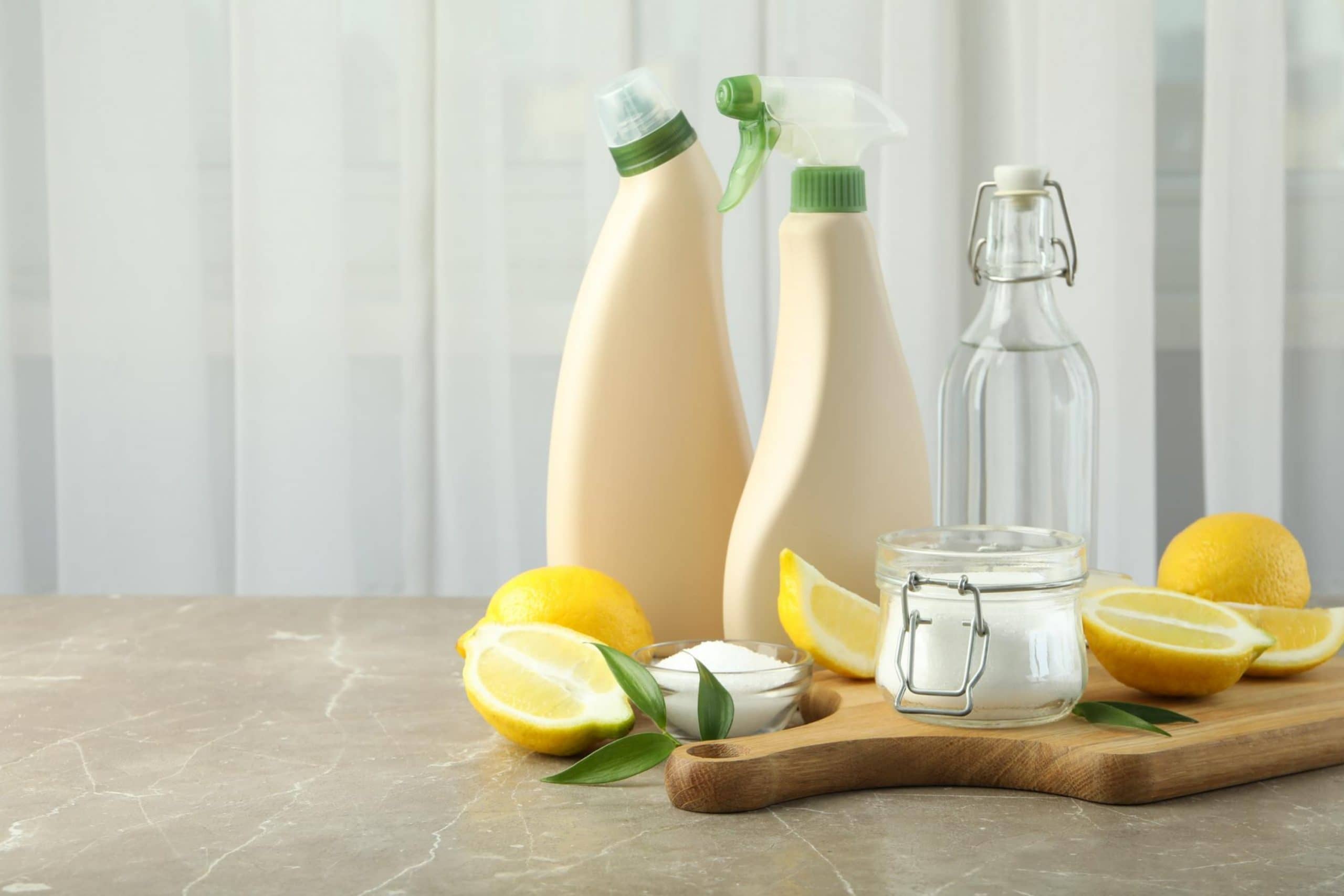
What Should Never Be Used For Cleaning a Concrete Patio If There Is Grass?
Grass can grow either around your concrete patio or, if the patio is made of concrete plates, you can have grass growing between them, creating a green natural pattern. In either case, cleaning such a patio requires additional care and delicacy!
This is why, if you want to keep your grass safe and sound, you should never use muriatic acid for cleaning your patio! Of course, this product is super-efficient when you need to deal with the tough and stubborn stains that have settled on concrete. Nevertheless, since it is an extremely corrosive acid, it must be used with extreme care and caution!
For example, whenever you work with muriatic acid, you must wear gloves, goggles, and protective clothing if you use this product. It is also very important that you are aware that this acid will likely kill your grass!
Similarly, cleaning a concrete patio with bleach, a strong basic solution, will kill mold and mildew as well as remove stains but also requires personal protective equipment.
By the way, bleach is also deadly for your grass and plants, so if you must use it (for example, in order to remove some extremely stubborn stains), make sure you dilute this product with enough water to make it less harmful.
And here is another warning for you: mixing acids and bases release toxic gases! This is why do not apply an acid product where a base product has been applied and vice versa. Do not apply a base product, like bleach, where you have just applied an acid product.
Also, you need to rinse the application areas thoroughly and let them dry completely before letting children or pets walk on them again.
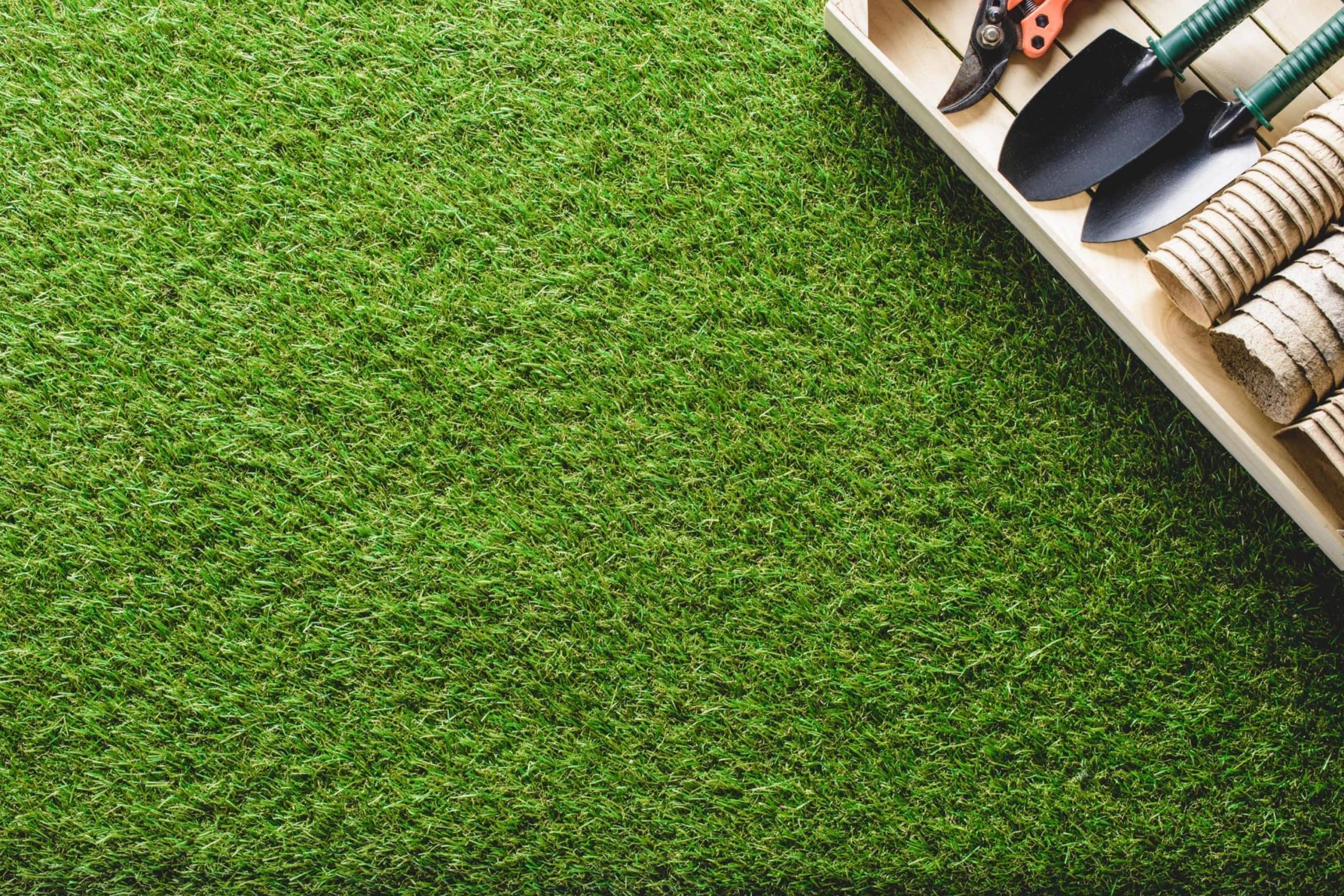
Some Extra Cleaning Methods For You Concrete Patio If It Has No Grass
Alright, now you know what cleaning solutions to use and how to apply them in order to clean your concrete patio if there is grass around it. But should you use the same methods for the grass-free patio?
Not quite. See, if your patio is free from grass and other plants, you can opt for one of the following methods. Each of them is the same safe and environmentally and concrete-friendly.
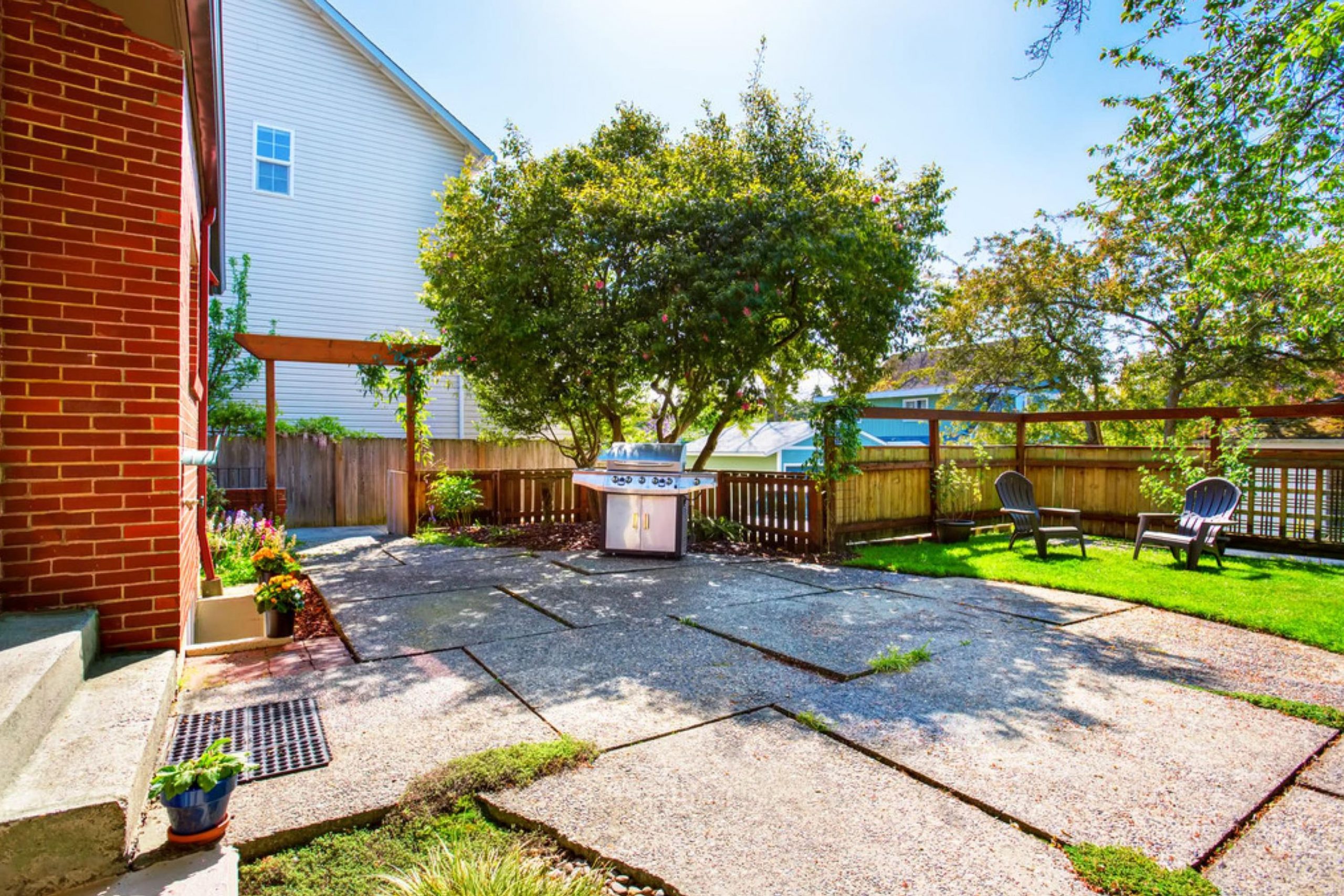
Oxy Solve Total Outdoor Pressure Washer Cleaner
This product will help you remove stains, mold, and dirt on patios easily. Oxy Solve Total Outdoor Pressure Washer Cleaner is a powerful cleaning product that combines the power of oxygen with other cleaning agents.
Such ingredients allow it to make dirt and grime disappear from your patio, as well as patio furniture, decking, outdoor grill, and more!
Another great feature of this product is that you can also use it indoors! It will work great for ceramic tile floors or any other area where you need an extra boost in cleanliness. Oxygen is a well-known powerful natural cleaner because it breaks down even tough stains like grease and oil. And since it is natural, it will cause no damage to your fragile surfaces.
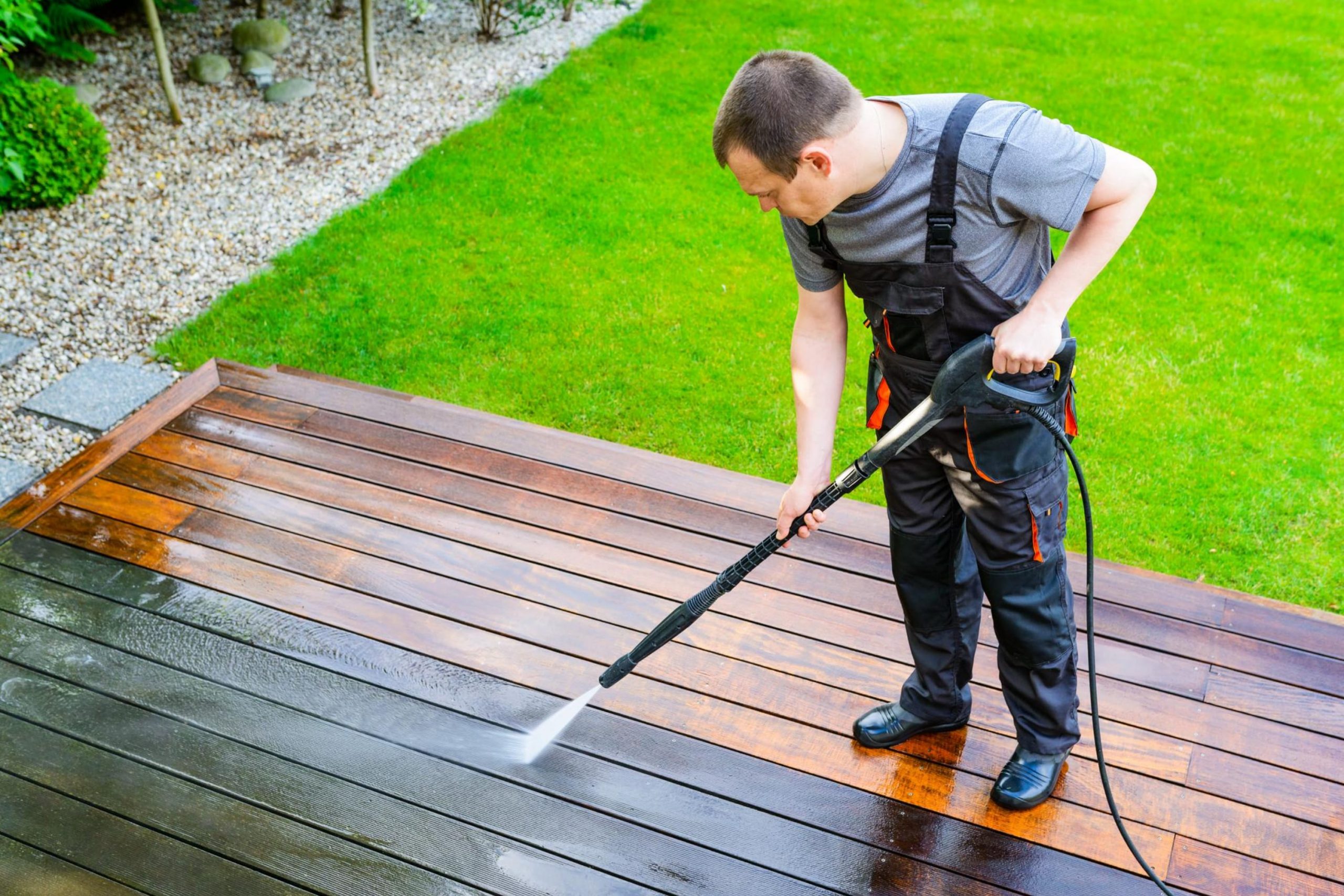
Use 30% Vinegar & Safe Industrial Strength Concentrate for Home & Garden
As you already know, white vinegar is a natural cleaner. Because of its natural origin, it is safe for all surfaces, and also, it is strong enough to cut through even the toughest stains. And since it is environmentally friendly, it won’t harm plants or pets.
Vinegar Pure Industrial Strength Concentrate is made from pure cane vinegar and distilled water with no added chemicals such as ammonia, so you can use it safely for cleaning your concrete patio (even if there is grass growing around!).
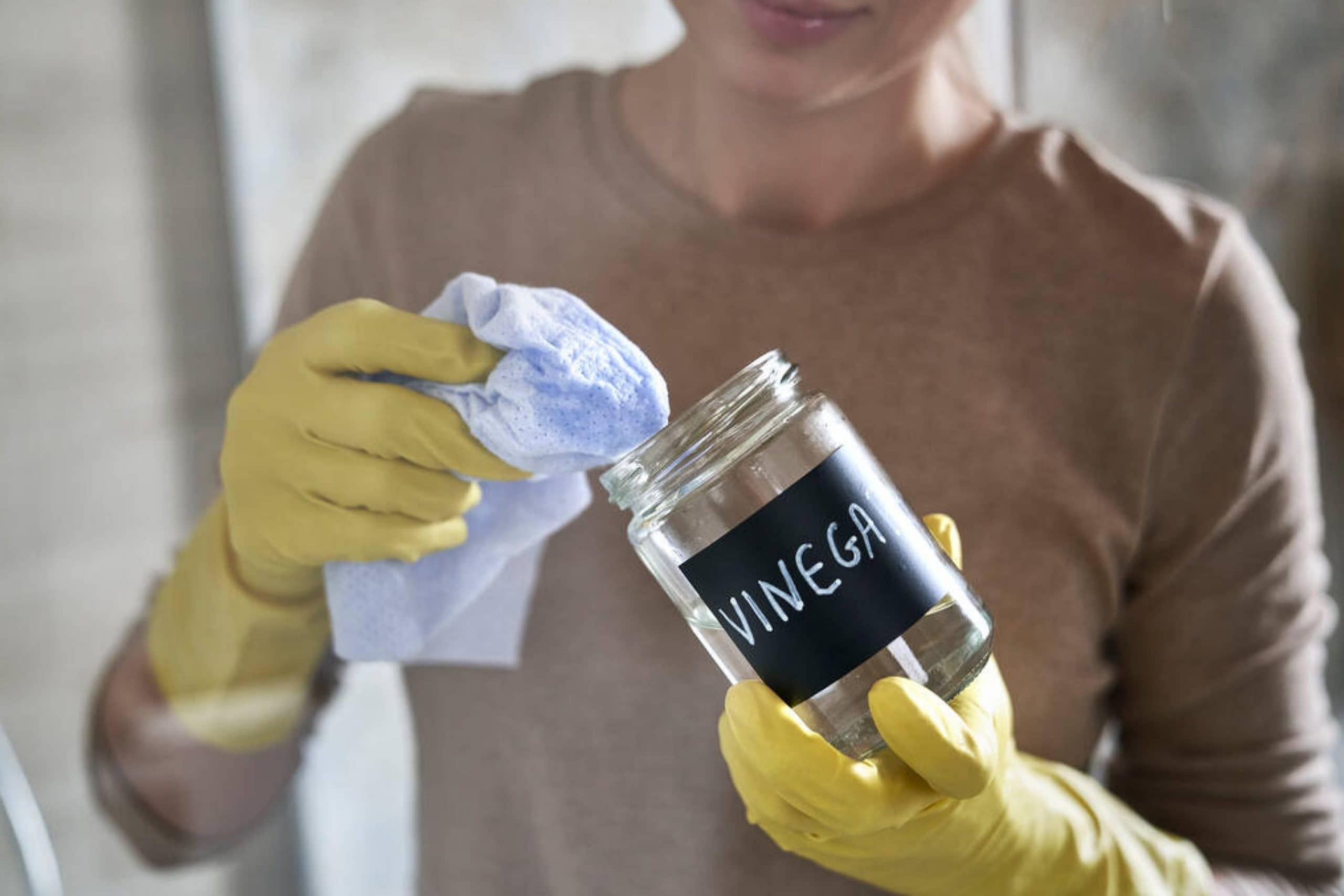
Safe And Easy Concrete Oil, Grease Cleaner & Stain Remover Spray
This product is a lifesaver! It allows you to get rid of all the oils and stains on concrete with just one quick spritz. As you probably know, concrete can be tough to maintain but this dirt cleaner will become your salvation. It removes oils, grease, and grime from both floors and walls in seconds!
Like this, now you know what products are better to be used for cleaning your concrete patio if it is moderately or heavily dirty.
And in addition, we explained what products should be avoided if you want to protect the grass or other plants growing around your patio.
With this guide and with all the detailed cleaning instructions we gave you, it will be very easy to keep your concrete patio in a decent state, always clean and dirt-free, which will contribute to its lifespan and make it serve you much longer.
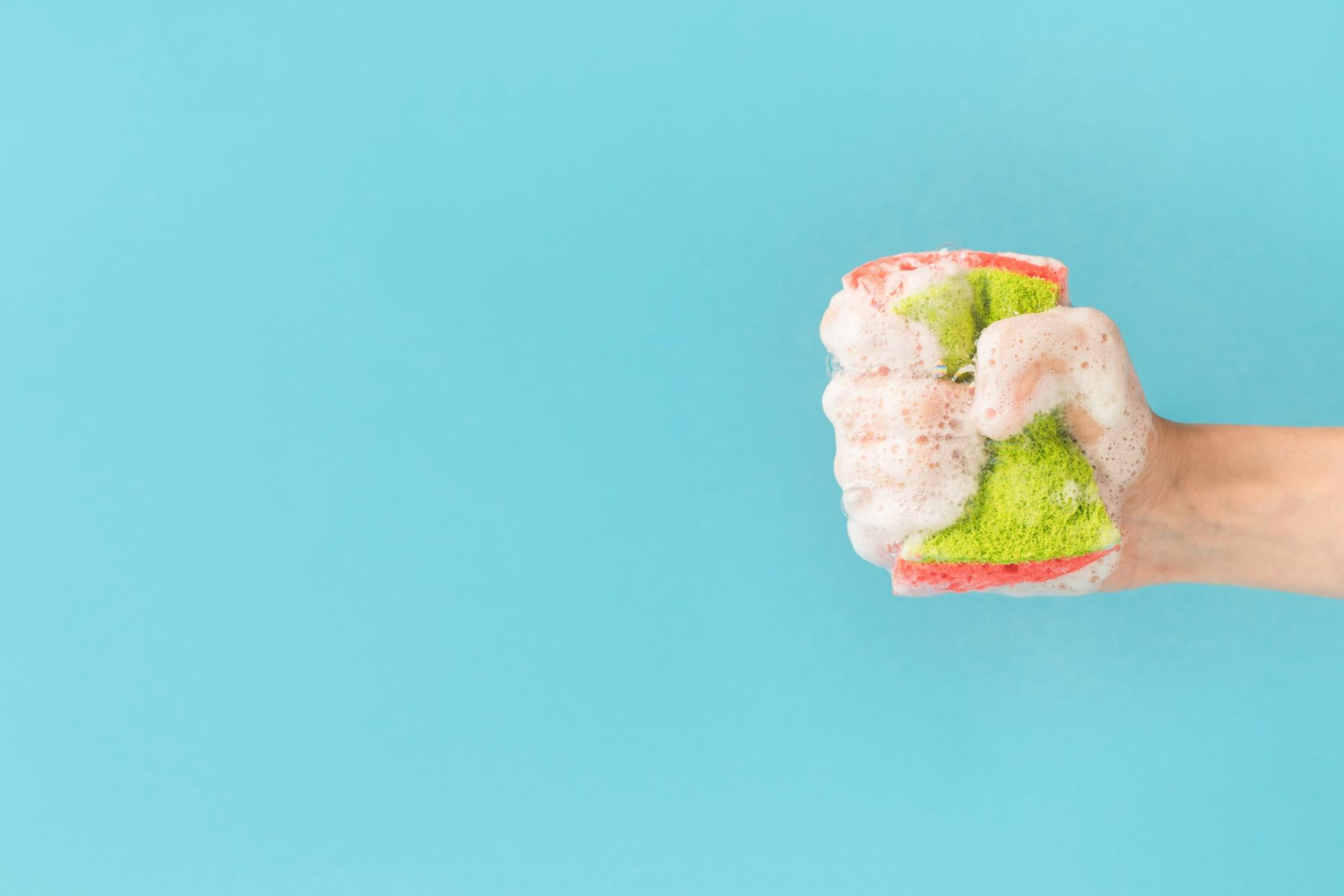
[wp-faq-schema title=”Frequently Asked Questions”]
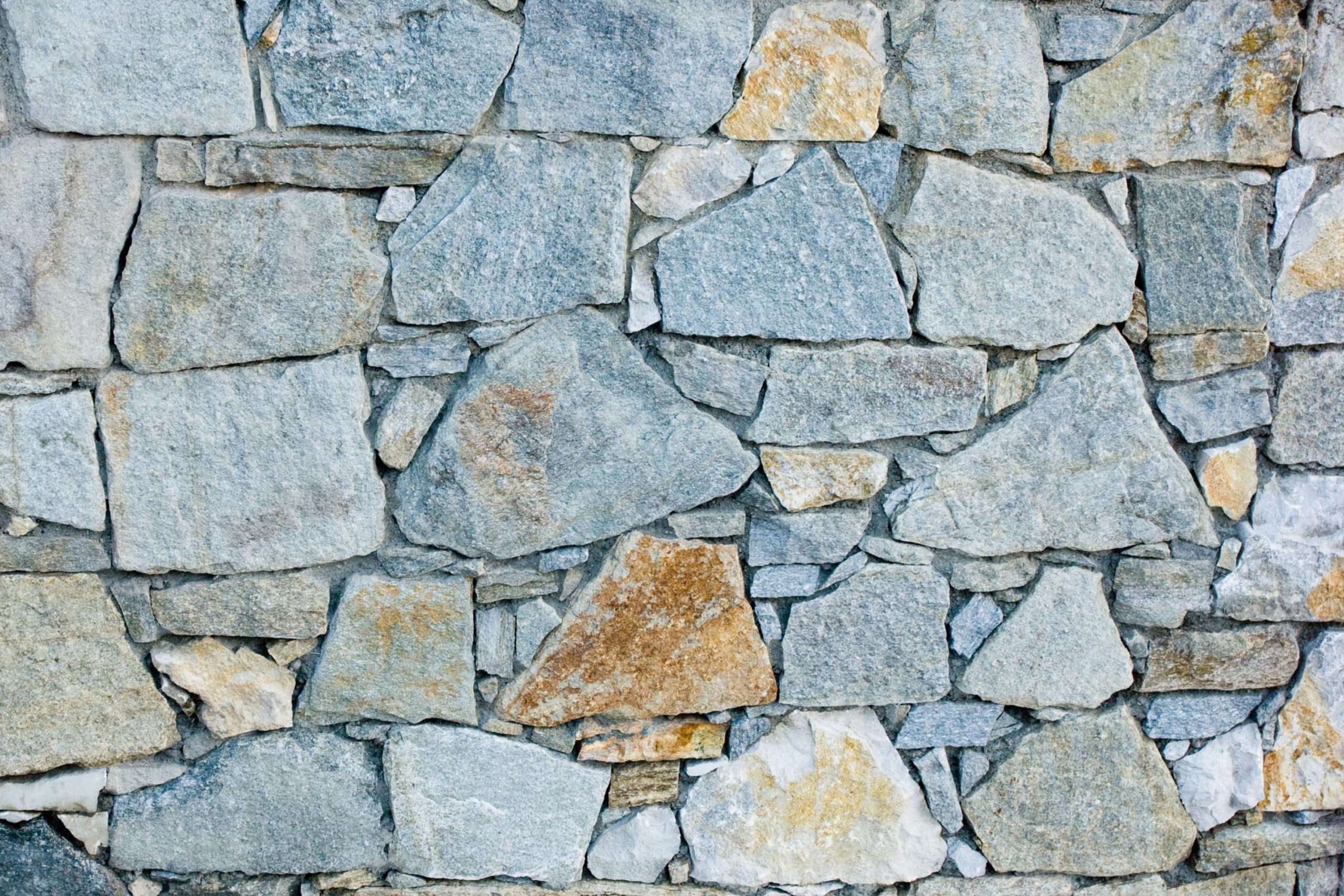
I washed some soil out and some grass as well when I was pressure washing my patio. Do you think it is possible to fix it somehow? The borders now look upsetting!
Well, I guess you could try to return the grass back if it was removed in pieces. But if your pressure washer just washed it our along with the soil…I think you’d better seed the new one.
Is there any way I can protect my concrete patio from being damaged when pressure washed? I’m now finishing the patio, the concrete will be poured in a couple of days. But since I’m not planning to wash it manually, I want to use a pressure washer. That’s why I’d like to protect the concrete somehow.
Hi! I heard that there arae special selants for the concrete that can be applied to the patios as well. They work as protectants and people say these sealants are very efficient against pressure washing. Unfortunately, I don’t know the name of the brand. But I’m sure you acn ask in any hardware store.